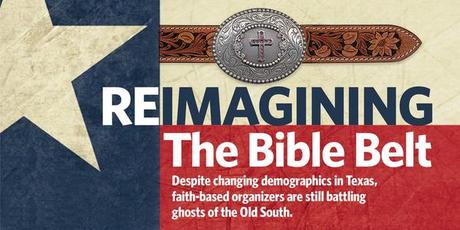This article by Lydia Bean (my daughter) and Danielle Ayers dominates the cover of this month’s Sojourner’s Magazine.

By Danielle Ayers , Lydia Bean July 2015
IF YOU’RE A Christian who cares about social justice, you can’t afford to ignore Texas.
In his book Rough Country, Princeton sociologist Robert Wuthnow puts it bluntly: “Texas is America’s most powerful Bible-Belt state.” Texas has the second largest population in the country, home to more than 26 million people. In 2014, Texans led six out of 21 congressional committees. And more than half of Texans attend church at least twice monthly.
No other state has more evangelical Christians than Texas. Many national Christian media companies, parachurch ministries, and influential megachurches are based in Texas. That’s why Texas is called the Buckle of the Bible Belt: It’s the most populous, wealthy, and politically powerful part of the country where evangelical churchgoing is still a dominant force.
But what if we reimagine the Bible Belt? In 2005, Texas officially became a “majority-minority” state, where traditional minority racial or ethnic groups represent more than half of the population. A majority of Texans under 40 in the pews are people of color. This creates an opportunity: Demographic change could lead to cultural change. What if we cast a new vision for faith in Texas public life that puts working families and people of color at the center?
But demographic change will not translate automatically into cultural change. The dominant historical Bible Belt narrative has influenced and shaped the identities of all Texas Christians, including in the African-American and Latino faith communities.
Christians and white supremacy
In Texas and most of the South, the dominant form of evangelical Christianity has been deeply complicit with white supremacy. During the ascendency of the Ku Klux Klan, many white Christians acted as if lynching was a legitimate defense of their white Christian civilization. In the 1920s, J. Frank Norris, pastor of a 10,000-member fundamentalist megachurch in Fort Worth, kept close ties with the Klan, according to author David R. Stokes. Norris, a powerful fundamentalist leader, even invited the Texas Klan’s Grand Dragon to lead prayer from the church’s pulpit one Sunday morning and later hired him to teach at the church.
In the 1950s and ’60s, the most powerful leaders in the Southern Baptist Convention—including W.A. Criswell, pastor of First Baptist Church of Dallas, the nation’s largest Southern Baptist church at the time—opposed the civil rights movement. In 1956, Criswell denounced the Supreme Court’s Brown vs. Board of Education decision that ruled racial segregation unconstitutional. “Let them integrate,” Criswell shouted before the South Carolina legislature, according to historian Andrew M. Manis. “Let them sit up there in their dirty shirts and make all their fine speeches. But they are all a bunch of infidels, dying from the neck up.”
Read more here
